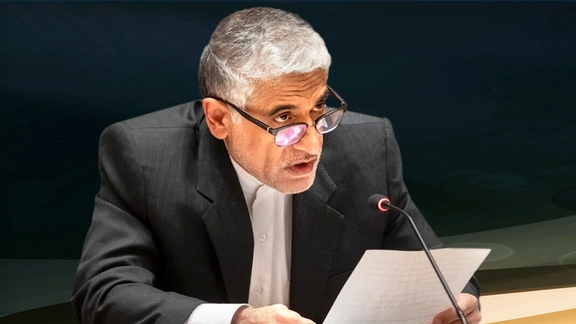Iran Asks Countries Not To Attend UN Meeting On Rights Violations

The Islamic Republic has urged countries not to attend a US-organized meeting at the United Nations over its human rights violations and violent crackdown on protesters.

The Islamic Republic has urged countries not to attend a US-organized meeting at the United Nations over its human rights violations and violent crackdown on protesters.
In a letter released on Monday, Tehran accused Washington of “politicizing” human rights issues, as Tehran has been cracking down on antigovernment protests, ignited by the death in custody of a 22-year-old woman.
Calling on UN member states to skip an informal meeting the US plans to hold among Security Council members, the Islamic Republic’s Ambassador and Permanent Representative to the United Nations Amir Saeed Iravani said, “The US has no true and genuine concern about the human rights situation in Iran or elsewhere.”
He called the ongoing protests an internal issue, warning that it would be “counterproductive to the promotion of human rights” if the UN Security Council discussed it. “The United States lacks the political, moral, and legal qualifications to hold such a meeting, distorting the very basic principles of human rights,” Iravani added.

The United States and Albania plan to hold an informal Security Council meeting on Iran on Wednesday, aimed at highlighting “the ongoing repression of women and girls and members of religious and ethnic minority groups,” and would “identify opportunities to promote credible, independent investigations into the Iranian government's human rights violations and abuses.”
The informal UN Security Council gathering was called by the US and Albania, which currently sits on the council. Iranian Nobel Peace Prize laureate Shirin Ebadi, actress Nazanin Boniadi, and Javaid Rehman, the UN Special Rapporteur on human rights in Iran, are due to address the gathering, which will be open to state representatives and human rights organizations.

The format of the meeting is called the “Arria formula”, after its originator, Diego Arria, a Venezuelan ambassador who in 1992 initiated the first informal meeting of the Council to discuss the crisis in former Yugoslavia. The meetings take place in a non-rigid setup where member states can hear comments by individuals and non-state actors.
Iran’s foreign ministry spokesman Monday dismissed the significance of the meeting and claimed that the aim of the meeting is to put “political pressure on the Islamic Republic,” and is the continuation of a clear policy of interference by the American government in Iran’s internal developments.”
Expulsion of Iran from UN Women Commission
Following weeks-long efforts by several countries as well as numerous calls by activists for the immediate expulsion of the Islamic Republic from the UN Commission on the Status of Women (CSW), the Canadian Parliament unanimously adopted a motion on Monday that calls for Iran’s removal.
Introduced by Conservative Party Deputy Leader Melissa Lantsman, the motion was adopted following a similar call made by New Zealand’s prime minister, and Canada’s deputy prime minister and foreign minister.
“Given the brutal death of Masha Amini at the hands of Islamic Revolutionary Guard Corps (IRGC), the subsequent crackdown in Iran on women’s rights, civil liberties, and fundamental freedom, and the long history of grave human rights abuses and violence against women perpetuated by the Iranian state, that this House declares its support for the removal of Iran from the UN Commission on the Status of Women,” read the motion.
A second motion put forward by Bloc Quebecois member of parliament Andreanne Larouche called on fellow MPs to declare support for Iranians protesting for their rights, and that the House of Commons “condemns the intimidation and bullying and violence against the protesters, who are supporting the movement to free women in Iran.”
In an open letter published in The New York Times on Sunday, Deputy Prime Minister Chrystia Freeland and Foreign Affairs Minister Melanie Joly joined other female world leaders in business, politics, and the arts from over 14 countries urging the UN to oust the Islamic Republic from the CSW.
The UN commission on the status of women is a global intergovernmental body “exclusively dedicated to the promotion of gender equality and the empowerment of women” through “promoting women’s rights, documenting the reality of women’s lives around the world, and shaping global standards on gender equality and the empowerment of women,” its website says.